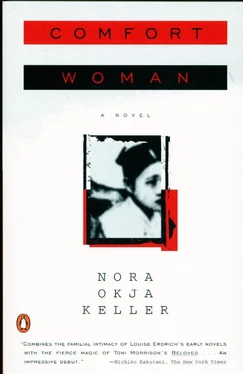Nora Okja Keller
COMFORT WOMAN
BECCAH
On the fifth anniversary of my father’s death, my mother confessed to his murder. We had been peeling the shrimp for his chesa, slicing through the crackling skins, popping the gray and slippery meat, ripe as fruit, into the kitchen sink. My mother, who was allergic to my father’s favorite food, held her red and puffy hands under cold running water and scratched at her fingers. “Beccah-chan,” she told me without looking up, “I killed your father.”
My mother picked at her hands, rubbing at the blisters bubbling between her fingers. I turned the water off and wrapped her hands in a dish towel. “Shh, Mommy,” I said. “Don’t start.”
“Never happen like this,” she said, trying to snap her fingers under the cloth. “I had to work at it.”
I led her to the kitchen table, clearing a place for her by pushing the stacks of offerings we planned to burn after I ate the remembrance feast my mother made to appease my father’s spirit. My father died when I was five, and this yearly meal, with its persistent smell of the ocean, and the smoke and the ash that would penetrate our apartment for days after we burned the Monopoly money and paper-doll clothes, supplanted my dim memories of an actual man. Even when I unearthed the picture I had of him from my underwear drawer, stealing a look, I saw him less and less clearly, the image fading in almost imperceptible gradations each time I exposed it to light and scrutiny.
What stays with me, though, is the color of his eyes. While his face, his body, sit in shadows behind the black of the Bible he always carried with him, the blue of his eyes sharpen on me. At night before I fell asleep, I would try to imagine my father as an angel coming to comfort me. I gave him the face and voice of Mr. Rogers and waited for him to wrap me in that cardigan sweater, which would smell of mothballs and mint and Daddy. He would spirit me away, to a home on the Mainland complete with plush carpet and a cocker spaniel pup. My daddy, I knew, would save my mother and me, burning with his blue eyes the Korean ghosts and demons that fed off our lives.
But when he rolled me into the sweater, binding my arms behind me, my father opened his eyes not on the demons but on me. And the blue light from his eyes grew so bright it burned me, each night, into nothingness.
I don’t remember what I felt the day my mother told me she had killed my father. Maybe anger, or fear. Not because I believed she had killed him, but because I thought she was slipping into one of her trances. I remember telling her, “Okay,” in a loud, slow voice, while I listed in my head the things that I needed to do: call Auntie Reno, buy enough oranges and incense sticks to last two weeks, secure the double locks on the doors when I left for school so my mother couldn’t get out of the house.
Most of the time my mother seemed normal. Not normal like the moms on TV—the kind that baked cookies, joined the PTA, or came to weekly soccer games—but normal in that she seemed to know where she was and who I was. During those times, my mother would get up when she heard my alarm clock go off in the morning, and before I pressed the second snooze alarm, she’d have folded the blankets on her side of the bed, poured hot water for the tea, and made breakfast: fresh rice mixed with raw egg, shoyu, and Tabasco. After eating, we’d dress and then walk down the water-rotted hallway of our building, past the “three o’clock” drunk asleep on the bottom stairs, to the bus stop. Instead of continuing straight to school, I’d wait with her until the number 8 came to take her to Reno’s Waikiki Bar-B-Q Hut, where she worked as fry cook and clean-up girl.
The days my mother was well enough to catch the bus, I would eat all of my school lunch at one time instead of wrapping half of it to eat before bed. Working at Auntie Reno‘s, my mother was able to bring home leftovers from the daily special; Auntie Reno, who isn’t a blood relative, was good to us in that way: she always made sure we had enough to eat.
I have a habit I picked up from those small-kid days, one that I can’t seem to shake even now. Before eating my meals, I set aside a small mound of rice—or whatever I’m eating—as a sacrifice for the spirits or for God, in case either exists. Even eating out with friends, I push the food around on my plate, severing a small portion, and think the prayer I have prayed ever since I can remember: “Please, God—please, spirits and Induk—please, Daddy and whoever is listening: Leave my mother alone.”

I loved my mother during the normal times. She laughed and sang songs she made up. Instead of telling me to clear my papers and books off the table for dinner, she’d sing it to me. We’d play hatto, and while she dealt the cards, she’d sometimes tell me stories about my father or Korea—stories that began “Once on a time” but occasionally hinted at possible truths. And she’d sit and watch me do my homework, as if I were the TV, and mumble about how smart I was, so smart that could I really be her daughter? Though I used to grumble at her—“What? What you staring at? I got two heads or something?”—inside I was really loving it, seeing how she smiled, how she looked at me.
But always, no matter how many piles of rice I left for the gods, no matter how many times I prayed, there came the times when—as Auntie Reno used to say—the spirits claimed my mother.
When the spirits called to her, my mother would leave me and slip inside herself, to somewhere I could not and did not want to follow. It was as if the mother I knew turned off, checked out, and someone else came to rent the space. During these times, the body of my mother would float through our one-bedroom apartment, slamming into walls and bookshelves and bumping into the corners of the coffee table and the television. If I could catch her, I would try to clean her cuts with Cambison ointment, dab the bruises with vinegar to stop the swelling. But most times I just left her food and water and hid in the bedroom, where I listened to long stretches of thumping accentuated by occasional shouts to a spirit named Induk.

It was worse when I was younger. When my father died, leaving us as guests of his most recent employers, at the Miami Mission House for Boys, my mother cashed what was left of his estate—several pieces of family jewelry, pearls mostly, and shares in a retirement village—paid off his hospital bills, and tried to return to Korea. She got as far as Hawai’i when—not knowing anyone, broke, and with a young child to care for—my mother had to put me in school and find work. I remember my mother drifting in and out of under-the-table jobs—washing dishes in Vietnamese restaurants, slinging drinks in Korean bars on Ke’eaumoku—stringing together enough change to pay the weekly rent on a dirty second-floor apartment off Kapi‘olani Boulevard. I remember the darkness of that apartment: the brown imitation-wood wall paneling blackened from exhaust from the street, the boarded-up windows, the nights without electricity when we could not pay the bill. And I remember nights that seemed to last for days, when my mother dropped into a darkness of her own, so deep that I did not think she would ever come back to me.
Читать дальше














